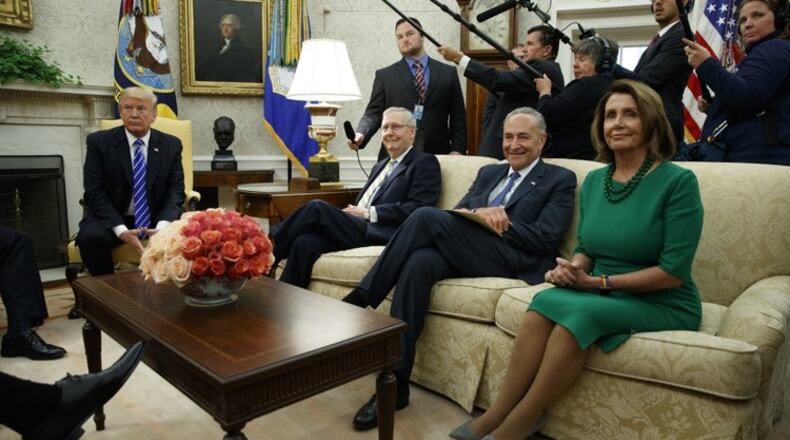It's an odd spectacle to see Democrats attacking a proper implementation of Obamacare that is projected to reduce health costs for many consumers and soon lead more people to have insurance. But that's what's happening after the Trump administration's decision to stop paying for so-called cost-sharing reductions (CSRs).
Headline writers are describing the move as if it will hurt the poor, because the CSRs are intended to offset out-of-pocket costs such as deductibles and co-pays for low-income Americans buying health insurance on the individual market. But an analysis by the Congressional Budget Office back in August forecast the opposite: "Most people," according to the agency, "would pay net premiums (after accounting for premium tax credits) for non-group insurance throughout the next decade that were similar to or less than what they would pay otherwise—although the share of people facing slight increases would be higher during the next two years."
The key phrase there is "after accounting for premium tax credits." That's because the practical effect for lower-income Americans -- whose share of premium costs are fixed by Obamacare -- will not be that their costs go up. Rather, they will instead get the money as subsidies toward premiums. Those premiums will rise, as insurers are forced to cover more costs for those customers without the benefit of CSR subsidies; but for those earning less than 200 percent of the federal poverty level, the premium subsides will offset the higher prices. In fact, CBO's analysis suggests people in that income range might end up with better plans than before.
Many of those earning 200-400 percent of the federal poverty level, CBO said, could see lower net premiums because the tax credits will rise by a larger amount than the CSR subsidies would have lowered their other costs. As a result, CBO concluded, "The number of people uninsured would be slightly higher in 2018 but slightly lower starting in 2020." While the agency has come to questionable conclusions about how the individual mandate will affect coverage, it has been more accurate about the number of people who will buy plans if tax dollars are subsidizing them.
Now, does this mean the new arrangement will be better or more sustainable? Not at all. Because the premium tax credits will rise by more than double the amount of the CSR subsidies (in the aggregate), federal deficits are projected to rise. And while about five in six people buying plans on the Obamacare exchanges have their premiums subsidized, the rest don't -- and they'll be facing much higher premiums without any subsidies to offset them. On the whole, Obamacare is still in lousy shape.
But here's the thing: The CSR subsidies shouldn't have been paid in the past anyway, because Congress didn't appropriate the money. It's yet another example of how the Obama administration flouted the law, the separation of powers, etc. to make its mess of a health law function. It's one of many problems with trying not only to make policy but to pay for policy through constitutionally dodgy means.
The law is going to function even worse now -- although, as I've previously explained , the death spiral of higher premiums was going to happen even if the CSR subsidies were continued. Maybe Congress will decide to start funding the subsidies. Or maybe it'll be the spark reluctant Republicans (or Democrats) need to get serious about fixing the problem. The key to finding a solution just might involve being forced to view the problem in every bit of its ugliness.
About the Author
The Latest
Featured



